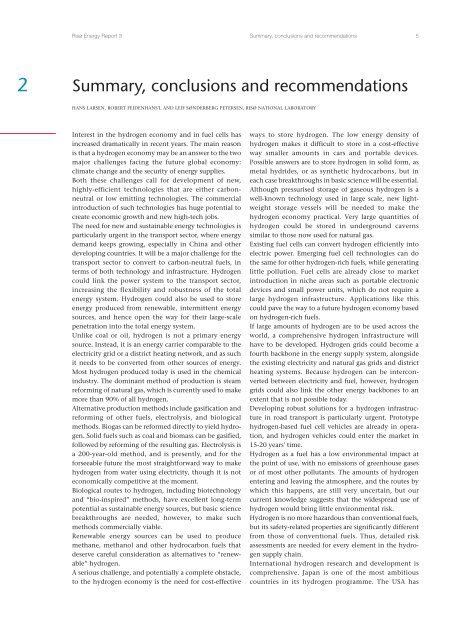Hydrogen and its competitors, 2004
Hydrogen and its competitors, 2004
Hydrogen and its competitors, 2004
You also want an ePaper? Increase the reach of your titles
YUMPU automatically turns print PDFs into web optimized ePapers that Google loves.
Risø Energy Report 3Summary, conclusions <strong>and</strong> recommendations 52Summary, conclusions <strong>and</strong> recommendationsHANS LARSEN, ROBERT FEIDENHANS'L AND LEIF SØNDERBERG PETERSEN, RISØ NATIONAL LABORATORYInterest in the hydrogen economy <strong>and</strong> in fuel cells hasincreased dramatically in recent years. The main reasonis that a hydrogen economy may be an answer to the twomajor challenges facing the future global economy:climate change <strong>and</strong> the security of energy supplies.Both these challenges call for development of new,highly-efficient technologies that are either carbonneutralor low emitting technologies. The commercialintroduction of such technologies has huge potential tocreate economic growth <strong>and</strong> new high-tech jobs.The need for new <strong>and</strong> sustainable energy technologies isparticularly urgent in the transport sector, where energydem<strong>and</strong> keeps growing, especially in China <strong>and</strong> otherdeveloping countries. It will be a major challenge for thetransport sector to convert to carbon-neutral fuels, interms of both technology <strong>and</strong> infrastructure. <strong>Hydrogen</strong>could link the power system to the transport sector,increasing the flexibility <strong>and</strong> robustness of the totalenergy system. <strong>Hydrogen</strong> could also be used to storeenergy produced from renewable, intermittent energysources, <strong>and</strong> hence open the way for their large-scalepenetration into the total energy system.Unlike coal or oil, hydrogen is not a primary energysource. Instead, it is an energy carrier comparable to theelectricity grid or a district heating network, <strong>and</strong> as suchit needs to be converted from other sources of energy.Most hydrogen produced today is used in the chemicalindustry. The dominant method of production is steamreforming of natural gas, which is currently used to makemore than 90% of all hydrogen.Alternative production methods include gasification <strong>and</strong>reforming of other fuels, electrolysis, <strong>and</strong> biologicalmethods. Biogas can be reformed directly to yield hydrogen.Solid fuels such as coal <strong>and</strong> biomass can be gasified,followed by reforming of the resulting gas. Electrolysis isa 200-year-old method, <strong>and</strong> is presently, <strong>and</strong> for theforseeable future the most straightforward way to makehydrogen from water using electricity, though it is noteconomically competitive at the moment.Biological routes to hydrogen, including biotechnology<strong>and</strong> “bio-inspired” methods, have excellent long-termpotential as sustainable energy sources, but basic sciencebreakthroughs are needed, however, to make suchmethods commercially viable.Renewable energy sources can be used to producemethane, methanol <strong>and</strong> other hydrocarbon fuels thatdeserve careful consideration as alternatives to “renewable”hydrogen.A serious challenge, <strong>and</strong> potentially a complete obstacle,to the hydrogen economy is the need for cost-effectiveways to store hydrogen. The low energy density ofhydrogen makes it difficult to store in a cost-effectiveway smaller amounts in cars <strong>and</strong> portable devices.Possible answers are to store hydrogen in solid form, asmetal hydrides, or as synthetic hydrocarbons, but ineach case breakthroughs in basic science will be essential.Although pressurised storage of gaseous hydrogen is awell-known technology used in large scale, new lightweightstorage vessels will be needed to make thehydrogen economy practical. Very large quantities ofhydrogen could be stored in underground cavernssimilar to those now used for natural gas.Existing fuel cells can convert hydrogen efficiently intoelectric power. Emerging fuel cell technologies can dothe same for other hydrogen-rich fuels, while generatinglittle pollution. Fuel cells are already close to marketintroduction in niche areas such as portable electronicdevices <strong>and</strong> small power un<strong>its</strong>, which do not require alarge hydrogen infrastructure. Applications like thiscould pave the way to a future hydrogen economy basedon hydrogen-rich fuels.If large amounts of hydrogen are to be used across theworld, a comprehensive hydrogen infrastructure willhave to be developed. <strong>Hydrogen</strong> grids could become afourth backbone in the energy supply system, alongsidethe existing electricity <strong>and</strong> natural gas grids <strong>and</strong> districtheating systems. Because hydrogen can be interconvertedbetween electricity <strong>and</strong> fuel, however, hydrogengrids could also link the other energy backbones to anextent that is not possible today.Developing robust solutions for a hydrogen infrastructurein road transport is particularly urgent. Prototypehydrogen-based fuel cell vehicles are already in operation,<strong>and</strong> hydrogen vehicles could enter the market in15-20 years' time.<strong>Hydrogen</strong> as a fuel has a low environmental impact atthe point of use, with no emissions of greenhouse gasesor of most other pollutants. The amounts of hydrogenentering <strong>and</strong> leaving the atmosphere, <strong>and</strong> the routes bywhich this happens, are still very uncertain, but ourcurrent knowledge suggests that the widespread use ofhydrogen would bring little environmental risk.<strong>Hydrogen</strong> is no more hazardous than conventional fuels,but <strong>its</strong> safety-related properties are significantly differentfrom those of conventional fuels. Thus, detailed riskassessments are needed for every element in the hydrogensupply chain.International hydrogen research <strong>and</strong> development iscomprehensive. Japan is one of the most ambitiouscountries in <strong>its</strong> hydrogen programme. The USA has
















